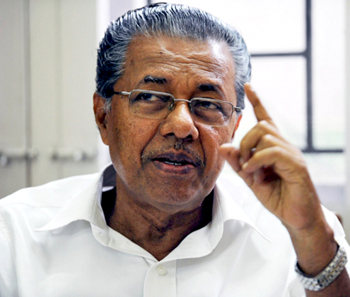Mangaluru, Feb 23: The Billava leaders in coastal Karnataka have expressed shock over the Sangh Parivar’s opposition to Kerala Chief Minister Pinarayi Vijayan’s participation in a harmony rally in Mangaluru this weekend.
 With Left parties and the organisations ideologically- affiliated to them welcoming Vijayan's scheduled visit to address a communal amity rally at Nehru Maidan on February 25, the Hindutva organizations have raised the anti-pitch by giving a call for a hartal on that day. The district BJP unit has declared support to the day long hartal.
With Left parties and the organisations ideologically- affiliated to them welcoming Vijayan's scheduled visit to address a communal amity rally at Nehru Maidan on February 25, the Hindutva organizations have raised the anti-pitch by giving a call for a hartal on that day. The district BJP unit has declared support to the day long hartal.
Rakshit Suvarna, a leader of Billava’s Union, has slammed the saffron groups for trying to demonize Vijayan, the only CM from Billava community in the country.
“Vijayan hails from a backward class and he is a proud representative of Billavas and other backward classes. Hence, Billavas of coastal Karnataka are eager to welcome him. The saffron leaders’ opposition to his Mangaluru visit has exposed their true colour,” he said.
Recalling that Sangh Parivar had vehemently opposed reservations to backward classes in the past, he said that the saffron groups are using Billava youths for their selfish gains in coastal Karnataka. “Many Billava youths were killed and hundreds landed in jails because of the communal politics of the saffron groups,” he alleged.
Also Read:
Section 144 imposed in Mangaluru; no permission for ‘hartal’
Be ruthless towards those disrupt peace in Mangaluru: Minister tells police
A day before Red brigade’s ‘harmony rally’, Mangaluru streets turn Saffron
6 drones, 700 CCTV cameras, 4k cops to ensure security during harmony rally




Comments
Kerala Chief Minister should come and deliver his speech...that is his right...he wont talk nonsense like Modi....this chief minister is a sensible person.
Its Congress government responsibility to keep peace and security of the region....put those bloody sanghis in the jail forever....don't let them go out even for urinal....
We coastal karnataka people should welcome a secular very popular CM of progressive and very secular politically matured Kerala State.
It is strange to notice that saffron groups objecting his visit to Mangalore to participate communal harmony rally it is need o the hour for coastal karnataka a very communal sensitive region.
It is also surprise national party like BJP also opposing honorable CM's visit.
Dear Peace Loving Mangaloreans,
Don't follow or hold criminal modis policy by cast politics. In INDIA every one has voting rights. Candidate may be from any cast he must sincere and must have faith on god and must respect all religion. The present KERALA CM is a straight forward sincere leader respecting all religion.
We all must stand together and well come him.
Don't and never be a follower of criminal rss.
Add new comment